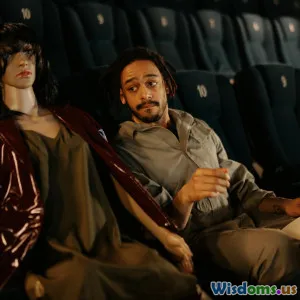
Is Modern Comedy in Movies Losing Its Edge? Let’s Examine the Trends
7 min read Explore modern movie comedy’s evolution and whether it’s losing its original edge in a landscape of shifting tastes and trends. (0 Reviews)
Is Modern Comedy in Movies Losing Its Edge? Let’s Examine the Trends
Comedy has long been a staple of cinema, offering laughter, social commentary, and a much-needed reprieve from daily stress. But as cinematic styles evolve and audience tastes shift, a question arises: is modern comedy in movies losing its edge? This article delves into the current trends shaping comedic films and what that means for the art and impact of movie comedy today.
The Golden Era of Comedy: Setting the Benchmark
To understand whether modern comedy is losing its sharpness, it’s helpful to reference what comedic edge meant historically. The late 20th century allowed filmmakers like Mel Brooks, Woody Allen, and the trio of Zucker, Abrahams, and Zucker to push boundaries with satire, slapstick, and smart dialogue.
Films like Ghostbusters (1984) and Airplane! (1980) exemplified fearless humor—bold parodies that combined absurdity with sharp wit. These movies remain classics not simply for laughs, but for their ability to lampoon prevailing cultural norms in ways that were fresh, irreverent, and thought-provoking.
Modern Comedy Films: What’s Changed?
1. Increasing Reliance on Formulaic Humor
A notable trend in recent years is the rise of predictable joke structures and plot formulas. Many modern comedies, such as Dumb and Dumber To (2014) or Grown Ups 2 (2013), recycle humor reliant on shock value, gross-out gags, or explicit content rather than clever setups.
Data from the Motion Picture Association indicates that comedic films leaning heavily on crude humor have proliferated, arguably diluting the complexity of laughs.
2. Genre Hybrids and Crossovers
Meanwhile, comedy is no longer isolated—it’s blended into other genres. Think about Marvel films like Guardians of the Galaxy or family ventures like The Lego Movie. The former uses humor within a superhero framework, whereas the latter blends animation with meta-comedy.
This genre cross-pollination has its perks: it expands comedy’s reach to diverse audiences. However, critics argue it sometimes waters down pure comedic impact as humor becomes a secondary element.
3. The Role of Social Media and Streaming
The explosion of platforms like Netflix, Amazon Prime, and YouTube has altered not only distribution but also comedy styles. Shorter attention spans and meme culture have led to jokes favoring immediacy over nuance.
For example, Netflix’s The Kominsky Method strikes a balance of witty, character-driven humor, while viral shorts favor punchlines and shareability. The shift influences how writers approach storytelling, aiming for broad accessibility sometimes at the expense of originality.
The Influence of Political Correctness and Cultural Sensitivity
Today’s comedy must navigate a cultural landscape rich with diverse perspectives and heightened awareness around social issues. Some audiences celebrate this, rewarding films that integrate sensitive themes thoughtfully.
For instance, Booksmart (2019) combines coming-of-age comedy with progressive storytelling, challenging stereotypes intelligently.
However, this has also led to polarizing perceptions:
- Some argue that political correctness restricts comedians and stifles edgy humor.
- Others believe comedy simply evolves to remain respectful and relevant.
In 2021, comedian Hannah Gadsby received attention for her unique blend of stand-up and social critique, indicative that comedy’s edge is not disappearing but transforming.
Statistically Looking at Comedy’s Impact Today
According to Box Office Mojo and Nielsen reports:
- Comedy films have seen a fluctuating box office draw, with fewer breakout global hits compared to action or franchise blockbusters.
- Critic scores on Rotten Tomatoes are mixed; formulas can lead to critical panning but sometimes solid audience returns.
This trend suggests that while comedy remains a popular genre, its traditional forms may be less dominant commercially.
Where Does Comedy Go from Here?
Rather than an outright loss of edge, many experts propose comedy is diversifying:
- Innovative voices like Taika Waititi (Jojo Rabbit) introduce humor intertwined with heartfelt narratives.
- International comedy gains more global traction, bringing fresh comedic styles that break Hollywood norms.
- Social commentary comedy remains a powerful tool — seen in films like Borat Subsequent Moviefilm (2020), which used satire to confront societal issues provocatively.
Filmmakers are experimenting with narrative complexity, character depth, and tonal blending instead of relying on punchlines alone.
Conclusion: The Comedy of Today Is Not Dull — It’s Different
The comedic landscape in movies is undoubtedly shifting. While some lament a decline in the edgy, unpredictable humor of previous decades, it’s clear comedy itself has adapted to new cultural frameworks, technological shifts, and storytelling demands.
Modern comedy in movies may lack the bluntness of past classics, but it compensates by engaging audiences with sharper social insight, blending genres, and creating humor that resonates on varied levels.
For viewers and creators alike, the takeaway is exciting: comedy isn’t losing its edge; it’s being reshaped. The invitation is to approach modern comedic films with an open mind and appreciate the evolving art form in all its diverse expressions.
Interested in how comedy continues to blend with culture and technology? Engage in forums, stream new releases, and support diverse voices redefining laughter today.
Rate the Post
User Reviews
Popular Posts


















